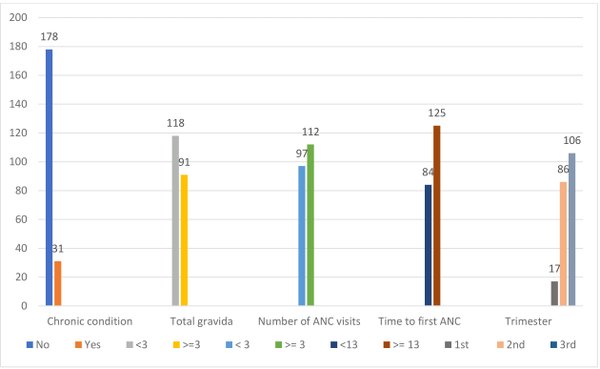-
Home
-
About JCTR
-
Gold Open Access
-
Issues
-
Editorial board
-
Author guidelines
-
Publication fees
-
Online first
-
Special issues
-
News
-
Publication ethics
-
Partners
-
Submit your manuscript
-
Submit your review report
-
Editorial Office
-

This work is licensed under a Creative Commons Attribution-NonCommercial 4.0 International License. ISSN print: 2382-6533 ISSN online: 2424-810X
Volume 9 Issue 1
Potentially harmful medication use and the associated factors among pregnant women visiting antenatal care clinics in Mbarara regional referral hospital, southwestern Uganda
John Isiiko*, Joshua Kiptoo, Tadele Mekuriya Yadesa, Daniel Chans, Rachel Alinaiswe, Joseph Ngonzi, Paul E. Alele
Isiiko et al. J Clin Transl Res 2023; 9(1):4
Published online: December 28, 2022
Abstract
Background: Pregnancy management using medications has been challenging for both healthcare providers and pregnant women, given the fear of teratogenicity effects and the potential for fetal harm. In the developing world, poor health-seeking behavior of patients, delayed initiation of Antenatal Care (ANC), and low level of educational status of mothers could contribute to the issue of drug safety in pregnancy.
Aim: To determine the prevalence and factors associated with potentially harmful medication use in pregnancy.
Methods: A cross-sectional study was conducted from April 1st to June 6th, 2021, including 209 pregnant women on ANC follow-up at a referral hospital in southwestern Uganda. The simple random sampling technique was employed to select study participants. Interviewer-administered questionnaires were used to collect the history of medication use since conception and then the participant’s antenatal care card was reviewed to determine prescribed drug regimens and their indications. Statistical Package for Social sciences (SPSS) version 23.0 was used for analysis.
Results: Out of the 1,422 medications used by 209 women, 665 (42.2%) were category C, and 182 (11.5%) were category A. A total of 92 (44.0%) pregnant women used at least one potentially harmful medication during the current pregnancy. Having more than average monthly income (AOR = 2.32 [1.04, 5.14 at 95% CI]), having a chronic disease (AOR = 3.24 [1.17, 8.97 at 95% C.I]), using 7 and more medications (AOR = 9.12 [4.11, 20.24 at 95% C.I]), use of herbal medicines (AOR = 4.50 [2.10, 9.87 at 95% CI]) were shown to be risk factors.
Conclusion: The proportion of pregnant women that used at least one potentially harmful medication is higher than in previous studies. Having comorbidities and taking more medications increase the risk of receiving a potentially harmful medication during pregnancy.
Relevance to patients: This study identified the gaps in the use of medicines during pregnancy which will enable the development and implementation of protocols for optimizing prescribing practices in pregnant women by focusing on the safety of the fetus.

DOI: http://dx.doi.org/10.18053/jctres.09.202301.004
Author affiliation
1. Department of Pharmacy, Mbarara University of Science and Technology, Mbarara, Uganda
2. Department of Pharmacy, Uganda Cancer Institute, Mbarara, Uganda
3.Department of Pharmacy, Ambo University, Ambo, Ethiopia
4. Department of Pharmacology, Mbarara University of Science and Technology, Mbarara, Uganda
5. Department of Obstetrics and Gynecology, Mbarara University of Science and Technology, Mbarara, Uganda
*Corresponding author
John Isiiko
Department of Pharmacy, Mbarara University of Science and Technology, Mbarara, Uganda
Department of Pharmacy, Uganda Cancer Institute, Mbarara, Uganda.
Tel: +256704441100
Email: isiikojohn@gmail.com
Handling editor:
Michal Heger
Department of Pharmaceutics, Utrecht University, the Netherlands
Department of Chemistry, Utrecht University, Utrecht, the Netherlands
Department of Pathology, Erasmus Medical Center, the Netherlands
Department of Pharmaceutics, Jiaxing University Medical College, Zhejiang, China

